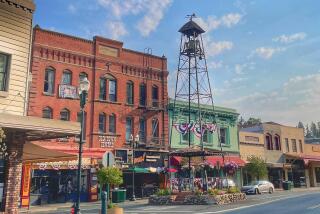Booming Leadville No Longer Deadville
- Share via
LEADVILLE, Colo. — In 1882, Oscar Wilde visited this rough-and-tumble mining town high in the Rockies and read the works of Renaissance author Benvenuto Cellini to a group of townspeople.
The crowd liked it so much they asked Wilde why he hadn’t brought the writer along. Wilde explained that Cellini was dead.
“Who shot him?” someone in the crowd asked.
The mines that made Leadville a tough and pitiless Wild West outpost are gone now. But although the place is a far cry from its heyday, when 40,000 people packed the city, Leadville is no ghost town.
In fact, Leadville is booming again, a growing middle-class community of charming Victorian homes.
“Leadville will never die because living here becomes the most important thing in your life,” said Stephanie Olson, who gave up her law practice to care for her children and run a small scenic railroad in Leadville, at 10,430 feet the nation’s highest incorporated city.
Part of Leadville’s rebirth can be attributed to the success--and sheer expense--of the nearby Vail and Copper Mountain ski resorts, where home prices start at $300,000. That has forced resort employees to turn to Leadville and its more affordable homes.
These days, most of Leadville’s revenue comes from small businesses, tourism and people living here and working in the ski resort towns.
Leadville also has become a magnet for ultra-marathoners and other extreme sports enthusiasts. And it holds burro races and ski joring, in which a rider on horseback pulls a skier through an obstacle course down Harrison Avenue, the city’s main street.
But history remains the area’s biggest draw.
Leadville was once part of the biggest silver-mining district in the country. Though Abe Lee first struck gold in the region in 1859, the big fortunes were made in the 1870s when silver made Meyer Guggenheim, Horace Tabor and J.J. Brown--husband of the “Unsinkable” Molly Brown of Titanic fame--the Silver Kings.
Hundreds of mines were carved in the 20-square-mile district, some on top of each other. At Leadville’s peak during the 1870s, tens of thousands of people caroused on the dirt streets, filling brothels and saloons.
Wilde, gunfighter Doc Holliday and suffragette Susan B. Anthony were among the colorful characters drawn to the boomtown 100 miles west of Denver.
Hangings were frequent and popular, drawing crowds of up to 10,000. Today, a judge takes visitors on a tour of 21 spots where murders were committed.
The recent influx of middle-income residents is changing the face of Leadville, squeezing out lower-income immigrant workers--many of them Latino--who had become a burden on the county’s budget.
John Ozello, head of social services for Lake County, said his welfare caseload has dropped from about 60 cases a month to 12 in the last several years, and fewer people are on food stamps.
The population is about 8,500, up 40% from 1990. Virtually every available home has been sold, and builders cannot keep up with demand.
Visitors now can sip lattes and read the New Yorker at the Cloud City Coffee House, in what was the atrium of Tabor’s Grand Hotel.
Not everyone is pleased with the transformation of the mining town to what some would call a tinsel town. State Sen. Ken Chlouber, a former miner, fears for the town’s soul.
“When we lost our mining industry we had to reach every which way, and now we’re getting a lot of developers. They want to pick the bones of what is left,” he said.
But nobody seems overly worried about the miners who lost their jobs with the closing of Leadville’s last mine Jan. 22. ASARCO’s Black Cloud mine, where lead, zinc, gold and silver were taken from the ground, had been losing more than $200,000 a month.
Hundreds of jobs are available in the region. Also, other mining companies are recruiting them.
Many of the jobs in the region require a drive “over the hill,” as the roads to the Copper Mountain and Vail ski resorts are called.
But the county is trying to keep jobs at home. It is working to build a small prison, Colorado Mountain College is expanding, and Copper Mountain is considering moving some of its operations to Leadville.
“We’re unsinkable,” Chlouber said. “But sometimes we get wet.”
More to Read
Sign up for The Wild
We’ll help you find the best places to hike, bike and run, as well as the perfect silent spots for meditation and yoga.
You may occasionally receive promotional content from the Los Angeles Times.






